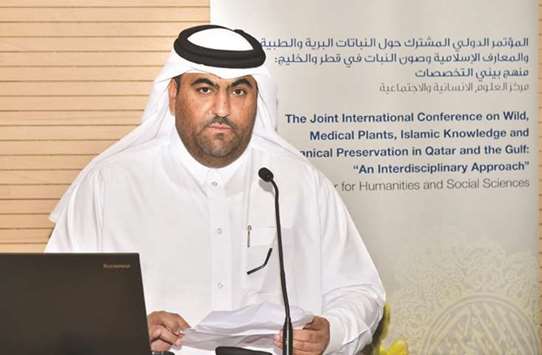A Qatar University (QU) conference has discussed the importance of medical and pharmaceutical research in studying the possibility of using wild plants in Qatar and the region to produce ‘Made in Qatar’ medicines to treat diseases, including cancer.
The Centre for Humanities and Social Sciences (CHSS) at Qatar University College of Arts and Sciences (QU-CAS) organised the conference, titled ‘Wild, Medical Plants, Islamic Knowledge and Botanical Preservation in Qatar and the Gulf: An Interdisciplinary Approach’.
Organised in collaboration with the Qur’anic Botanic Garden (QBG) at Qatar Foundation, the conference aimed to provide an opportunity to plan an interdisciplinary approach to study medicinal herbs, including those mentioned in the Holy Qur’an and other sacred Islamic texts. It also aimed to raise awareness on the importance of traditional herbs in the modern medical context.
The opening session was attended by CAS dean Dr Rashid al-Kuwari, CHSS director Dr Kaltham al-Ghanim, QBG director Fatima al-Khulaifi, secretary-general of International Union of Muslim Scholars professor Ali al-Qaradaghi and CHSS researchers, as well as CAS faculty and students.
The programme agenda featured five sessions and a number of presentations delivered by professor al-Qaradaghi, professor at QU College of Medicine Dr Serhiy Souchelnytskyi, professor of Organic Chemistry at the CAS Chemistry and Earth Sciences Department professor Hala al-Easa, QU Center for Sustainable Development (CSD) research assistant professor Dr J Jed Brown, and professor of Organic Chemistry and Vice-Chancellor for Graduate Studies, Research and External Relations at the
University of Nizwa, Oman, professor Ahmed al-Harasi.
They presented on ‘The study of medical plants in Islam”, ‘Medicinal plants in the treatment of cancer’, ‘Qatar’s natural pharmacy’, ‘Comparative study of the chemical composition of the halophyte species native to the Arabian Gulf’ and ‘Medical uses of frankincense, luban’.
A sideline exhibition featured information booths on medicinal plants and their seeds and leaves, as well as medicinal plant products.
Dr al-Kuwari said, “This conference brings together experts from various fields to highlight the importance of medical and pharmaceutical research in studying the enormous possibility of using wild plants in Qatar and the region to produce medicines to treat diseases, including cancer. We look forward to the fruitful results that will emanate from the discussions and bring hope to millions of patients for a safe and affordable ‘Made in Qatar’ medicine.”
Dr al-Ghanim noted,“The conference aims to develop an interdisciplinary framework for the study of herbal medicine in Qatar and the Gulf region. The results will contribute to designing future interdisciplinary projects that involve faculty from QU colleges of Arts and Sciences, Medicine, Pharmacy, and Shariah and Islamic Studies. This event will also encourage humanities and social sciences young researchers to develop the study and analysis of herbal medicine and determine its sustainable value in the current medical practices.”
Al-Khulaifi added, “This conference is the first collaboration between the Qur’anic Botanic Garden and Qatar University Centre for Humanities and Social Sciences. It aligns with the vision of Qatar to lead the human, social, economic and environmental development through education and research.”

Dr Rashid al-Kuwari
